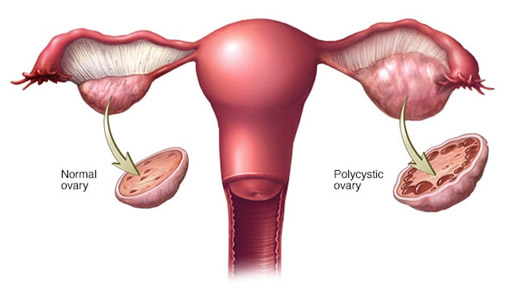Polycystic Ovary Syndrome
Polycystic Ovary Syndrome (PCOS) is a problem in which a woman’s hormones are out of balance. It can cause problems with your periods and make it difficult to get pregnant. PCOS may also cause unwanted changes in the way you look. If it is not treated, over time it can lead to serious health problems, such as diabetes and heart disease.
PCOS is common, affecting as many as 1 out of 15 women. Often, the symptoms begin in the teen years. Treatment can help control the symptoms and prevent long-term problems.
What are hormones, and what happens in PCOS?
Hormones are chemical messengers that trigger many different processes, including growth and energy production. Often, the job of one hormone is to signal the release of another hormone.
For reasons that are not well understood, in PCOS, the hormones get out of balance. One hormone change triggers another, which changes another. For example:
- The sex hormones get out of balance. Normally, the ovaries make a tiny amount of male sex hormones (androgens). In PCOS, they start making slightly more androgens. This may cause you to stop ovulating, get acne, and grow extra facial and body hair.
- The body may have a problem using insulin, called insulin resistance. When the body doesn't use insulin well, blood sugar levels go up. Over time, this increases your chance of getting diabetes.
What are the Symptoms?
- Acne
- Weight gain and trouble losing weight
- Extra hair on the face and body. Often, women get thicker and darker facial hair and more hair on the chest, belly, and back.
- Thinning hair on the scalp
- Irregular periods. Often, women with PCOS have fewer than nine periods a year. Some women have no periods. Others have very heavy bleeding.
- Fertility problems. Many women who have PCOS have trouble getting pregnant (infertility).
- Most women with PCOS grow many small cysts on their ovaries. That is why it is called polycystic ovary syndrome. The cysts are not harmful but lead to hormone imbalances.
Diagnosis
- Medical history: Your doctor will ask about your menstrual periods, weight changes, and other symptoms.
- Physical exam: Your doctor will want to measure your blood pressure, body mass index (BMI), and waist size. He or she will also check the areas of increased hair growth. You should try to allow the natural hair to grow for a few days before the visit.
- Pelvic exam: Your doctor might want to check to see if your ovaries are enlarged or swollen by the increased number of small cysts.
- Blood tests: Your doctor may check the androgen hormone and glucose (sugar) levels in your blood.
- Vaginal ultrasound (sonogram): Your doctor may perform a test that uses sound waves to take pictures of the pelvic area. It might be used to examine your ovaries for cysts and check the endometrium (lining of the womb). This lining may become thicker if your periods are not regular.
Complications

- Infertility
- Gestational diabetes or pregnancy-induced high blood pressure
- Miscarriage or premature birth
- Non-alcoholic steatohepatitis — a severe liver inflammation caused by fat accumulation in the liver
- Metabolic syndrome — a cluster of conditions including high blood pressure, high blood sugar, and abnormal cholesterol or triglyceride levels that significantly increase your risk of cardiovascular disease
- Type 2 diabetes or prediabetes
- Sleep apnoea
- Depression, anxiety and eating disorders
- Abnormal uterine bleeding (AUB)
- Cancer of the uterine lining (endometrial cancer)
- Obesity is associated with PCOS and can worsen complications of the disorder.
